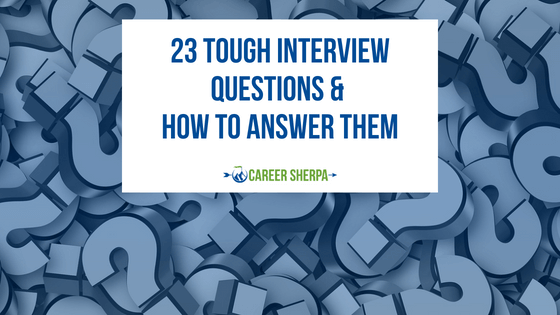Knowing how to answer tough interview questions is a valuable skill for any job-seeker. And while they might seem intimidating at first, they''re quite easy to deal with if you''re prepared.

Check out this list of hard questions you''ll likely get asked in your next job interview, and how you should approach your answers.
1. Share a Time When You Overcame an Obstacle at Work
This question is relatively common regardless of the position. Interviewers ask this question to unveil how you deal with workplace difficulties. Every job comes with challenges; this is your opportunity to show how you tackle them efficiently.
Hiring managers don’t want to bring people in who will crumble under pressure or panic at every hurdle. They want people who will think clearly, be proactive, and take action to find a solution and move forward.
The best way to answer is to tell a short story and provide a real-world example. Start by summarizing the situation before going into your role, the action you took, and how it positively impacted you and your company.
2. Tell Me About Yourself
Here’s another tough question interviewers like to ask. It usually comes during the early parts of your interview and acts like an icebreaker to help you get comfortable. Interviewers are really asking 'Why are you qualified for this job?'.
There’s no universally “correct” answer to this question. However, the best way to approach it is to highlight the most important parts of your background that align with what you know about the job. This could include recent education, work experience, skills, and achievements.
It’s always a good idea to familiarize yourself with the job description and shape your answer around what the company is looking for in a new hire. This summary is only the start of the interview, don''t feel you have to explain everything. Just touch on the most important qualifications.
3. Why Do You Want to Leave Your Current Job?
Interviewers like this question because it can help them understand if the new position you''re applying for will align with your career goals.
Briefly and truthfully highlight why you’re looking for something else. Whether it’s greater responsibility, changes in your priorities, or the desire to find more rewarding work, don’t be afraid to talk about it.
However, you should avoid bad-mouthing your employer, boss, or colleagues. Keep your answer focused on what you want, not how terrible your current situation may be.
4. What Do You Consider to Be Your Biggest Weakness?
Many job-seekers have a tough time answering this question. It can be tricky to talk about your weaknesses when your goal during an interview is to reassure hiring managers that you’re the right fit. But the reason interviewers ask this is to see if you have the ability to identify and fix your flaws or imperfections. It''s a question about how self-aware you are.
Interviewers know that you’re not perfect. Everyone has strengths and weaknesses. The important thing is that you’re aware of and actively working on those weaknesses to improve your work performance.
Talk about one aspect of your career that needs work on and what you’re doing to correct them. Just be sure not to pick something that is a key requirement of the job you are interviewing for.
5. What Was the Most Rewarding Aspect of Your Last Job?
Your response to this tough interview question can give hiring managers more insight into your passions and motivators. It’s a way to better understand if you’ll be happy and engaged with this new role.
Hiring managers also want to understand what parts of your career excite you most. Employees who are genuinely interested in what they do often work harder and stay with companies longer.
Think back to some of the highlights of your previous job. It can be an activity part of your day-to-day work life or special moments that left a lasting impact on you. Whatever the case, talk about why you liked it.
6. Why Should We Hire You?
This is another tough interview question that trips up applicants quite often. You know why you want the job, but putting into words why you deserve it is more challenging. Interviewers ask this question to see how well you understand the job and why those things align with your background.
Focus on your skills and qualifications. Study the job description to better understand what the company is looking for and how you fit. Highlight those details and reiterate your interest.
Next, think about what might differentiate you from other candidates. What do you have to bring to the table that no others have?
When putting your answer together, connect the dots between your qualifications and the new position. Tell them what qualities you have and how they can benefit you in the role.
7. Why Do You Want to Work Here?
What is it about this company in particular that excites you?
This question provides peace of mind to interviewers and hiring managers. They want to know that you didn’t blindly apply to an open position and hope for the best. Companies want to hire individuals who genuinely want to work for their organization.
Before you head into your interview, learn as much as you can about the company. Understand its mission statement, goals, and what makes it unique. Then, use those details to discuss what attracted you to this opportunity.
8. What Lessons Have You Learned From Your Mistakes?
This tough interview question is similar to the one about weaknesses. However, it focuses more on your ability to identify mistakes and learn from them.
Again, no one is perfect. Even the most skilled employee will make a mistake. But how you respond to that mistake matters. Employers ask this to uncover how you own up to your mistake and how you changed, learned, or improved.
The best way to create an answer is to share an example of a misstep you had from a previous job. Detail the situation, what happened afterward, and what you did to ensure it never occurred again. The goal is to highlight your ability to identify mistakes, respond maturely, and grow as an employee.
9. How Do You Respond to Stressful Situations?
Stress is a common factor in any job. How you respond to it can impact your performance, mental health, and more.
Hiring managers want to learn about your coping strategies. They want to hire individuals who can handle stress effectively without it getting in the way of their productivity and well-being.
To develop a memorable answer, think back to stressful situations in your previous jobs. Provide one real example and go into detail about how you tackled that scenario. Focus on the positive outcome and provide details about what actions you took to overcome or eliminate stress to prove that you’re capable of dealing with it.
10. What Critical Feedback Do You Receive the Most?
Like the earlier question about your biggest weaknesses, this topic is about showing that you’re self-aware and proactive. That''s exactly what interviewers are evaluating when asking this question.
Getting critical feedback isn’t easy. But, you can expect to get feedback on this job and any other position you get in the future. Learning how to take it constructively makes all the difference.
Reflect on a genuine piece of criticism you got at an old job. It can be something about your workstyle, performance, or skill gaps you had to overcome.
Explain the criticism, explain how you addressed it or what you did to improve, and finally, what the outcome of your changes was.
11. What Aspect of Your Last Job Did You Like the Least?
Every job comes with its pros and cons. Interviewers want to know what you disliked about your last role, to assess if you’ll be satisfied with the one you’re interviewing for. This can be a hard interview question to answer because it focuses on the less positive aspects.
Think about the times you were unhappy with the work you were doing, then what you did to make it more tolerable. Try not to dive too deep into negativity. Interviewers want to see how you respond to aspects of your job you don’t like. More importantly, they want to know if what you didn''t like in your last job is part of the job you are interviewing for. If so, it would be a big red flag for them.
Feel free to discuss a part of your job you didn’t enjoy, but focus on how you dealt with the situation and continued to maintain productivity.
12. What Do You Look for in a Manager or Supervisor?
Here’s another tough interview question that often feels like a hard-to-win situation. The interviewer, often your potential new manager or supervisor, wants to know if they''ll meet your expectations.
Think about your favorite manager and what qualities made them a good boss. Explain why those qualities motivated you or made you a better employee.
You also want to express that you can learn and grow under any management style. This shows that you are flexible and can adapt to changes in management.
13. What is Your Greatest Achievement?
This question allows you to talk about something you’re truly proud of accomplishing. Interviewers will use your response to understand what experiences you value in your professional career.
Reflect on a recent achievement from your work experience. Think about the steps you took to complete it and why it means so much to you. Ideally, the achievement will have something to do with the job you’re trying to land.
Explain the achievement, what you did to get there, and why it’s valuable to you.
14. Do You Have Any Regrets About Your Career?
Talking about regrets is tough. It requires self-reflection and some vulnerability. But this question can impact what interviewers think of you and your potential.
Your answer tells interviewers and hiring managers a lot about you. It shows whether you dwell on regrets or take action to move forward. Regrets can hold people back, and interviewers want to know that’s not the case for you.
The goal of this difficult interview question is similar to related questions about weaknesses. It’s about self-awareness and your willingness to take action.
You can talk about true regrets you have in your professional career, but it’s wise to focus more on how those regrets helped you grow.
15. Are You Afraid of Failure?
Failure is another thing that’s unavoidable in your professional career. There will be times when you don’t succeed or fall short of your own expectations. Once again, your response to those situations matter.
This question aims to give interviewers more insight into how you respond to failure. Do you let it negatively impact your performance moving forward? Or do you use it as fuel to fire your passions and goals?
The best answer highlights your ability to do the latter. Talk about a time you did not succeed or live up to your expectations. There''s no need to go into a lot of detail about how you failed. Instead, turn your focus on how it helped you learn, adapt, or grow.
16. Why Do You Want This Job?
Contrary to how it sounds, this tough interview question isn’t about you wanting a bigger paycheck or better job title. It’s about telling the interviewer what you want to gain outside of a paycheck.
Money is important, but it shouldn’t be your primary reason for getting the job.
Focus on what interests you about this position and what you hope to gain from it. That could be more experience, the opportunity to do a job you’ve always wanted, better alignment with your values, etc. Highlight the non-monetary gains you’ll get and reiterate your passion for this role and/or organization.
17. What is Your Desired Salary?
Discussing salary expectations can feel awkward. You might feel like you should avoid it until getting a job offer. However, you want to make sure your salary expectations align with what the company is offering so it''s best to address this early.
Interviewers use this question to see what it’ll cost them to bring you on. It’s not a part of the negotiation process. That will come later if you get a job offer. Instead, this question is a jumping-off point to give the company a better idea of your expectations.
Research the job, company, and salary ranges in your area so you have a salary range ready to present. But first, try asking what the company has budgeted for the role. So you can adjust your range if necessary. Don''t provide an exact number. Remember, you don''t have all the details about the job yet so give yourself some wiggle room. Also, reiterate your interest in negotiating later.
18. How Much Has Luck Impacted Your Career?
This question feels odd, but it’s deeper than it seems at face value.
Your answer tells the interviewer a few things. First, it shows how you feel about your success. Do you believe that everything you’ve accomplished thus far was sheer luck? Or are you confident enough to say that you worked for what you have?
Also, it gives you an opportunity to show a bit of gratitude and humility. Almost everyone has benefited from some element of luck on their professional journey. Being aware of this is quite healthy!
19. How Do You Handle Conflict in the Workplace?
Conflict in the workplace is never fun. It can cause rifts between teams and create a whirlwind of unnecessary drama. Interviewers ask this question to evaluate how you respond to stressful situations and get reassurance that you’re not a drama magnet.
You can talk about a past experience, but avoid getting too personal or negative. Instead, focus on what you did to resolve the conflict. Show your maturity and capability to squash conflict before it gets out of hand. This shows you know how to navigate those conflicts to succeed in your career.
20. How Do You Define Success?
Your definition of success tells interviewers a lot about who you are and what’s important to you. Everyone views success differently. For some, it’s getting the highest position and the biggest salary. But for others, it’s deeper and revolves around their passions. Interviewers really want to know what motivates you to succeed and how your interpretation of success fits into their business.
Talk about one example of a success you had and specifically what you did to reach that goal. Be sure to explain why achieving this goal was important to you. By doing this you shed light on your passions and larger career aspirations.
21. Why Did You Apply For This Job?
When you apply for a job, interviewers expect to hear why you chose their job. However, it’s common for job-seekers to apply to so many jobs that they fail to understand what every opportunity entails. That’s not a good thing.
Interviewers want to know that you’ve researched and understand the job requirements. Not only does that show you’re prepared, but it shows that you’re interested in more than a paycheck. Understanding the job’s requirements will set you apart from the competition.
Study the job description, research the company, and learn everything you can. When answering this question, bring up points in the job posting that interest you and explain why. It could be you have previous experience or knowledge or that you want to develop further knowledge in a specific area.
22. What is Your Ideal Company Culture?
Being a good fit for a job is about more than your qualifications. You can have the best education and years of experience. But if you’re not the right fit for the company culture, you may not succeed in the role. That''s why interviewers ask this question. They want to know if your expectations match what they offer.
This can be a tough interview question to answer if you''re not prepared, so do some research ahead of time. Learn about the work environment by reaching out to existing employees, reading review sites, and asking current or previous employees.
When developing your answer, use what you learned to point to the parts of their culture you perform well in. It''s always a good idea to use a specific example of a time when you were successful in a similar environment. This reassures the interviewers that you will fit in without any issues.
23. What are Your Career Goals?
Last but not least, we have a question about your long-term goals. With this question, interviewers want to learn about your grander aspirations. It’s a way to understand how this position and company fit into the bigger picture.
Hiring employees is a big investment. If the interviewer senses you plan to leave as soon as the next opportunity comes up, it may be viewed as a waste of time and resources to hire you.
Discuss how this role fits into your career plan and why you think working at the organization is the right move.
Conclusion
We hope this list of tough interview questions and answers will help you get prepared and feel confident.
Remember, knowing what to expect in the interview will significantly improve your chance of getting hired!
The post 23 Tough Interview Questions & How To Answer Them appeared first on Career Sherpa.









